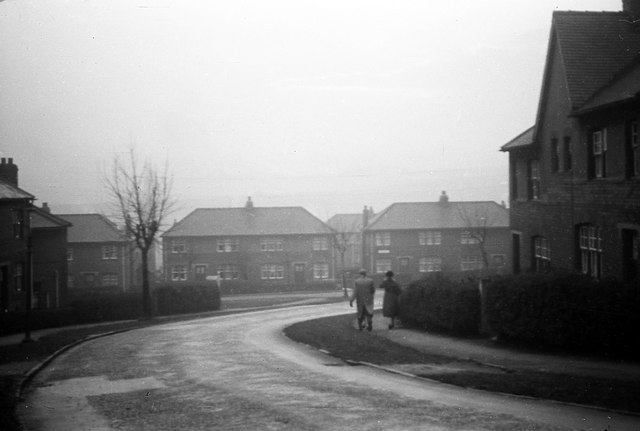“Oh.” She handed the picture back to him. “I
wonder who they were. Anyway, you can pop it in the rubbish I suppose.”
He frowned. “I think
I’ll keep it,” he said. “Someone might know something. My mate Josh, he
likes local history, he’s one of those blokes digging up the old City Station
up near Halfords. He knows how to look at the old census returns and he can see
who lived here.”
“Please
yourself,” said Priscilla. “I have 20 essays to mark before lunch.”
She went
out. Martin looked at the picture then up at her retreating back. And stuck his
tongue out. Then he chuckled, tucked the picture away in his jacket and went
back to work.
Priscilla
went back to her study. She did not hear the front door close or feel the faint
breeze as a middle-aged woman in an apron and sensible shoes descended the
stairs behind her.
In the
front room a man with a pipe and cardigan looked up from the Daily Sketch
as his son and daughter came in.
“Did they
get the proofs?” called his wife as she turned into the kitchen at the back of
the house. “Ted, Sarah, is that you?” She went on into the kitchen, filled the
kettle and put it on the range. “I’ll make a cup of tea.”
“Don’t make
tea if we haven’t the coal,” her son called out. “You’re spoiling me, Mum, but
you’ll need it when I’m gone.”
“Don’t
worry, Ted. We’ve got a hundredweight in hand, and we’re allowed more on the
first of the month.” She came into the front room, wiping her hands on her
apron. “Let’s see these pictures then. Oh, they’re lovely, aren’t they?”
“They’re
not bad, eh?” Her husband smiled up at her. “And old Pringle on his own now,
with his son in for the duration, as they say.”
“He’s back
on leave,” said Ted. “Mr Pringle told me. He’s been in Egypt, he said.”
“We’re not
supposed to say where people are,” his father said.
“I don’t
think as we’re going to lose because someone knows where young Pringle is, Bill.”
She took the proofs from him and leafed through this one, then stopped. “Oy!
What’s happening here!”
“It was
Ted,” said the girl. “He sticks his tongue out and before I know it I’m
sticking mine out as well. Let’s get Pringle’s to blow that one up.” She
giggled.
“Oh no we won’t. You can have that one, you
cheeky monkey,” her mother said, and handed her the proof. “Dad and I’ll choose
one for the mantelpiece. Ted, you must get ready, you’re off in half an hour.”
“I’ll help
him pack his kitbag,” said Sarah. “He’ll scrunch up his shirts otherwise. Boys
are so messy.”
They rushed
up the narrow stairway of the small house and their footsteps could be heard from
the master bedroom, where Sarah had laid out her brother’s clothes ready for
folding.
“I reckon
this is the one we’ll get blown up,” said Bill, and looked up at his wife, who
looked at him then tried
to dry her eyes on her apron but couldn’t because it was tied at the waist so
she untied it, sniffing and laughing at the same time. “Oh, I am silly,” she
said.
“Try and
hide it, my dear. It won’t make it easier for him, you know. And he’s left home
before. Remember he went off to basic training, then the Isle of Man, and now he’s just going off for more training.”
“Oh, I
know. It’s just that I have a bad feeling about this,” she said. “As if he’s
leaving home for the last time.”
“Well he
probably isn’t,” said her husband, a little shortly. He was silent for a
moment, then said: “Don’t fret. Sit down and let’s listen to the news, eh?”
He got up
and twisted the Bakelite knob on the wireless. The dial took on a soft,
old-gold glow and the sound started, softly at first then growing louder as the
set warmed up. The Home Service filled the room, an emollient voice reading the
six o’clock news.
Upstairs, Ted
sat on his parents’ bed and watched as his sister folded his shirts.
“I want to
do something too,” she said. “I’m going to join the Women’s Land Army.”
“Not yet
you’re not,” he said. “You’re only 17.”
“I’ll be 18
at Christmas,” she said.
“But you
have to be 20, don’t you? Anyway, you’d be dead useless shovelling manure. Or
catching rats. Imagine you catching rats. They’d take one look at you and you’d
scream your silly head off.”
She gave
his leg a pretend slap with the back of her hand. She went back to folding and
smoothing the shirts. He watched her deft movements as she said: “Dad says
you’re going for more training.”
“Yes,” he
said. “Well, sort of. I’m posted to No. 12 OTU at Chipping Warden in the
Midlands. It’s near Banbury I think. An OTU is an Operational Training Unit.”
“Does
Operational mean what I think it does?”
“Yes. But
it shan’t be much. Just minelaying off the coast and stuff I expect. You
mustn’t worry.”
“Oh.” She
thought for a moment. “Do you remember when I was 10 and Roy from No. 6 pulled
my pigtails?”
“No, I
don’t,” he replied. “Did he really? What a rotter.”
“Yes, and
you boxed his ears.”
“Oh, I
think I do remember. Did I box his ears? I thought I gave him a Chinese burn.”
She sat
still, looking down at the shirt. A silence grew heavy.
“Look, we
all have to do it,” he said. “Everyone’s leaving home. Dad did last time. Roy’s
gone, come to that.” He paused. “Have you got that proof Mum gave you? Give it
here.”
She did,
and he knelt down where there was a creaky floorboard, just beside the bed so
their mother always stepped on it in the night. He pushed the small square of
paper down between the cracks.
“There,” he
said. “When it’s all over and I’m home, we’ll pull that floorboard up and get
that picture, and we’ll have a giggle about it and I do think I’ll go down to
Pringle and get it blown up.”
“And if you
don’t come back, I’ll leave it there,” she said. “And maybe in 70 or 80 years’
time, someone’ll find it and wonder who we were.”
“That’s it.
But I’ll be back.”
“Hope so.”
She looked at him.
“Ted,” his
father called up the stairs. “It’s 6.30. You ready? Where you going from
anyway, City Station or Thorpe?”
“Thorpe,”
he said. “They bombed City Station.”
His sister
finished folding shirts and he clattered down the stairs with it and took his
greatcoat and gas-mask case from the coathooks.
“I can go
with you,” said Sarah.
“Don’t,” he
said. “Station’ll be bedlam. So many trains going now. ’Spect I’ll get a cuppa
on the platform though, the WVS ladies have a canteen there when it’s busy.”
“I’ll come some
of the way with you though.”
“Just to
the corner, all right? We can say goodbye there.”
Her father
was looking at her as she put her coat on. He leaned towards her. “Leave him at
the end of the road, my dear. Let him be. They need to be alone with their own thoughts
a bit when they go,” he whispered.
She nodded
and waited while her brother gave his mother a peck on the cheek and shook
hands with his father; then they went out into the street. It was nearly dark.
The blackout was complete, but the moon was almost full and its light
caught the beginnings of a frost on the pavement. She walked with him to the
end of the street, where it joined The Avenues. To the left the road ran
downhill, in a straight line; then it climbed to a junction about a quarter of
a mile away. There the road joined another and swung round to the right. They
didn’t say anything, but he paused a moment and grasped her shoulder and
squeezed it with his hand, and seemed to want to say something but didn’t; then
he turned abruptly and trudged away. She watched him for several minutes, the
moon making a stark figure of him, standing out against the glitter of the
frosted pavement. Then he rounded the bend at the top of the hill. He paused
for a moment and she thought he looked back, the moonlight catching his face;
but he was too far away to see really, and then he was gone.

___________________________________________
More flash fiction from Mike
Fashion Wokeness and subversion. With style
Mike Robbins’s latest book, On the Rim of the Sea, is now
available as a paperback or ebook. More details here.
.jpg)









